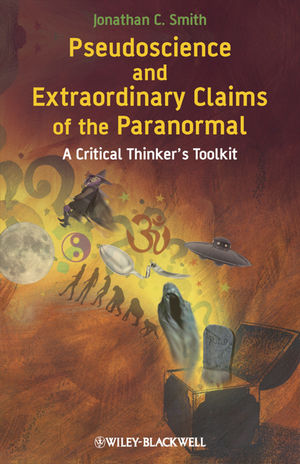Pseudoscience and Extraordinary Claims of the Paranormal: A Critical Thinker's ToolkitISBN: 978-1-4051-8123-5
Hardcover
432 pages
September 2009, Wiley-Blackwell
 This is a Print-on-Demand title. It will be printed specifically to fill your order. Please allow an additional 10-15 days delivery time. The book is not returnable.
|
||||||
"This book, particularly in regard to its discussion of memory errors and its insistence on the value of real science, takes a place of prominence on my personal library shelf."
–James Randi, Chairman of the James Randi Educational Foundation
"I am astonished by the excellence of this book. Smith has
produced a highly readable and very entertaining yet critical
examination of virtually the entire gamut of paranormal claims, and
he demonstrates an encyclopedic knowledge of the field in doing so.
While drawing extensively from psychology, physics, logical
analysis and history, he always manages to keep things clear and
straightforward, so that one is never lost in complexity. Moreover,
the tone is light-hearted throughout, and never becomes pedantic or
condescending. And the book offers much more than an evaluation of
extraordinary claims. It provides a refined set of critical
thinking tools that the reader will find invaluable in everyday
life. I strongly recommend this book to everyone who values the
pursuit of truth in all things. And I can only wish that those who
know that they already have the truth would read it as well, for
they need it the most."
–James Alcock, PhD, Professor of Psychology, York
University
"Can you be both a critical thinker and a believer in the
paranormal? The “reality checks” in Jonathan
Smith’s Critical Thinker’s Toolkit will guide you to
your answer."
–Robert Todd Carroll, author of The Skeptic's
Dictionary
"An excellent, engaging, and highly readable introduction to the
paranormal and to the distinction between science and
pseudoscience. A superb student-friendly guide to extraordinary
claims. Chock full of interesting and fun examples, not to mention
humor. Should become a favorite in undergraduate psychology
courses."
–Scott O. Lilienfeld, Emory University



